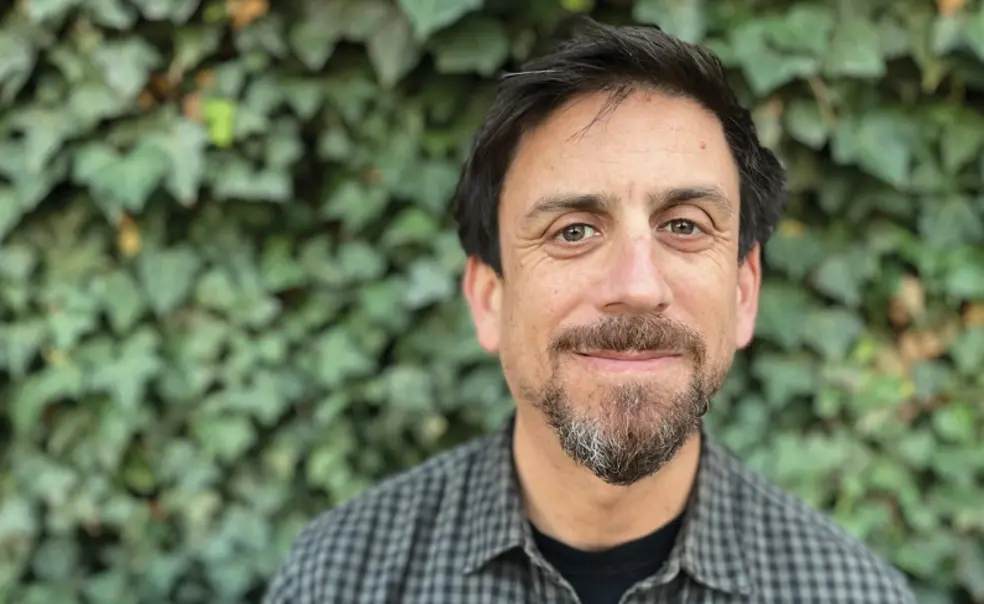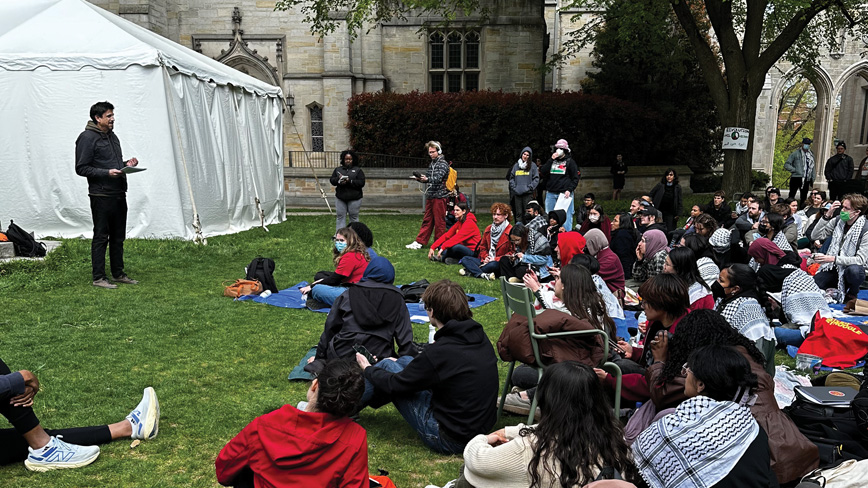Outspoken Advocate for Palestinians Takes Unusual Path to Professorship
History professor Max Weiss says he was put on probation, then promoted to full professor
Max Weiss, a professor of history who specializes in cultural and intellectual history in 20th- and 21st-century Syria, Lebanon, Palestine, and Israel, has been getting mixed messages from Princeton administrators.
According to Weiss, he first received word last fall from Dean of the Faculty Gene Jarrett ’97 that he was on probation for his involvement in the spring 2024 pro-Palestinian encampment on Princeton’s campus. Around the same time, he was promoted to full professor by the Board of Trustees.
Weiss appealed his probation, and this spring, he said he was told that his appeal had been denied and would hold until the end of the academic year. According to Weiss, he found out within a week of conversations he had with Princeton President Christopher Eisgruber ’83 affirming that Princeton “seriously defends the rights of faculty members to free speech and academic freedom,” Weiss said.
Weiss, who joined Princeton’s faculty in 2010, found the communications “rather bizarre” and “quite unusual.” “It was in both cases as though one hand did not know what the other was doing,” he said.
Jarrett told PAW he does not comment on personnel matters.
PAW has not seen the probation notification or appeal, but according to Weiss, he was told he “had engaged in unprofessional conduct, which was coercive … [and] intimidatory” and that further unprofessional conduct would result in additional discipline up to and including dismissal.
Weiss said his probation was the result of a student complaint after he held his last class of the 2024 spring semester, which he said was optional, at the encampment in McCosh Courtyard on April 25, the day it was established. His class, History of Palestine/Israel, was the first to be held there, though other faculty followed.
Gyan Prakash, also a professor of history, told PAW he was issued a written warning by Jarrett for holding class at the encampment. Both Weiss and Prakash said the Committee on Conference and Faculty Appeal recommended their discipline be retracted but ultimately were overruled.
The University did not have a policy specifically about holding class at a protest at the time of the encampment but clarified its position in September on the University’s protest FAQs, writing that classes at or near protest sites are impermissible and the classroom “is a place of trust, respect, and inclusivenes.”
Weiss has long been unabashedly supportive of Palestinian rights, which “outweighs my fear of academic repression on campus, political repression outside of campus, and even worse forms of coercion, intimidation, and violence that are being deployed against Palestinians and those who support them the world over.”
He was an undergraduate at the University of California, Berkeley, majoring in molecular and cell biology when he took a trip to Jerusalem that changed his life. He spent a summer there in an intensive language program, which sparked an interest in the Middle East, leading him to double major in history. After further study, Weiss “realized that I had less interest in continuing to work in the chlamydia research laboratory” at Berkeley, “and increasingly got involved in Middle East politics and academia.”
He was one of a handful of faculty members who, in 2014, called on the University to divest from companies they alleged “contribute to or profit from” Israel’s occupation of the West Bank. As PAW reported at the time, the Council of the Princeton University Community’s Resources Committee “decided that the faculty petition did not meet guidelines for consideration because there was no consensus and sustained interest had not been demonstrated.”
The Resources Committee again cited failed consensus when ruling on a similar student-led divestment petition in March, though it acknowledged sustained interest in the issue, particularly after Hamas’ attack on Israel on Oct. 7, 2023, and the ensuing war. “I’ve been teaching at Princeton for over 15 years now,” Weiss said. “I think even if I had been here for 50 years, I might say that I have not seen the kind of mobilization and activism on campus that I’ve seen. It has been a dramatically transformed situation.”
Weiss said he believes it’s his role as an educator to speak to the broader community. He is a member of the Princeton chapter of Faculty and Staff for Justice in Palestine and is a co-convener of Princeton’s Palestinian Studies Colloquium, which began hosting events this fall.
In addition to writing a follow-up to his 2022 book on the cultural history of Ba’thist Syria, Weiss is translating several modern Arabic novels, as well as pursuing “my own individual research on … the policing of speech and action that is deemed anti-Zionist.” He has co-organized two conferences on the history, theory, and politics of anti-Zionism, including “The Anti-Zionist Idea V.2,” which was held in Princeton this April.
And of course, he’s still teaching. This spring, he taught The Modern Middle East in McCosh Hall, next to the first site of last spring’s encampment. Weiss said he sincerely hopes that one day he’ll walk by “a plaque on McCosh Courtyard marking the occasion of the first encampment, and … not a sign banning us from accessing Cannon Green.”













4 Responses
Jason Aingorn s’05
8 Months AgoPrinceton’s Goal Should Be Multiple Perspectives
The May 2025 edition of PAW spent a number of pages describing President Eisgruber’s defense of academic freedom with regard to the broader ongoing issue of federal grant funding to elite American universities. One can take issue with the federal government’s tactics, but there is no denying there is a structural issue that has been festering for far too long in many academic departments that needs to be addressed. The article describing how Prime Minister Naftali Bennett’s event was disrupted by illiberal anti-Israel activists, followed by the profile on Professor Max Weiss, who appears to take pride in masquerading propaganda as scholarship, helps to drive this point home. Naftali Bennett's governing coalition included the Arab Ra'am political party, which characterizes itself as Islamist and is associated with the southern branch of the Islamist Movement in Israel. Let that sink in. Mansour Abbas, the head of the Ra'am party advocates extensively for Arab citizens of Israel as well as Palestinians, and demonstrates a commitment to coexistence that is absent from the rhetoric of erasure and implied violence of the campus activists who disrupted the event with Naftali Bennett. It should be met with incredulity to believe that the anti-Israel, totalitarian activist cohort knows and understands how to solve Mansour Abbas' challenges better than he does. It should be Princeton's goal to defend academic freedom and take the brave steps needed to encourage thought, reasoning, and analysis with students able to access multiple perspectives and sources, rather than indoctrination in a shallow, narrow political agenda with regard to Middle East studies. If professors Robert George and Cornel West can do so in their symposium on political thought, then it is absolutely possible to bring sanity back to campus in other disciplines.
Mark Schwartz
2 Weeks AgoComment on Multiple Perspectives
Beautifully stated.
Michael Scharf ’64
9 Months AgoWeiss Is Not What Princeton Needs
Princeton continues to amaze me by the declination of its academic standards. Max Weiss as a professor is just what Princeton does not need at this time when it seems to tolerate the scourge of hateful antisemitism. Max Weiss considers Palestine to be a country. It is not. He apparently wants to replace the country of Israel, which exists on land bequeathed to it by God. His views are a manifestation of chutzpah!
Philip Gaffney ’65
9 Months AgoComplicated History of the Middle East
Max Weiss is exactly what Princeton needs as a moderate scholar who understands both sides of a complicated history where both Palestinians and Jews have rightful heritage claims to the Holy Lands.